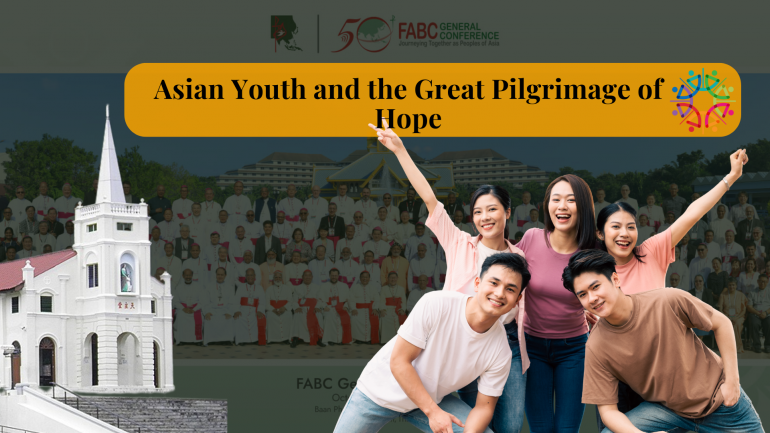FABC’s 50 Years of Journey with Asia’s Youth: Great Pilgrimage of Hope

As the Church in Asia prepares for the Great Pilgrimage of Hope, scheduled to take place in Penang from November 27–30, the event stands as a meaningful occasion for the faithful across the continent to renew their commitment to walking together as one Asian Church.
The pilgrimage invites all, especially young people, to journey in hope, solidarity, and shared responsibility for nurturing the life of the Church. This spirit of companionship reflects a path begun more than fifty years ago, when Asia’s bishops made the care and formation of young people a central priority.
Embracing the Youthfulness of Asia
In 2024, Cardinal Mario Grech, Secretary-General of the Synod of Bishops, offered a compelling challenge to the Church in Asia. Given the continent’s rich tapestry of cultures and beliefs, he said Asian Catholics are uniquely positioned to lead the Universal Church in evangelizing young people.
“The Church in Asia can be a powerful laboratory for experimenting with pastoral strategies intended to form young people,” the Maltese prelate affirmed. This call resonates deeply within a continent known for its cultural diversity and youthful population, urging the Church to energize its programs and accompany young people as vibrant witnesses of faith.
In truth, Asia committed itself to this mission more than fifty years ago.
During the first plenary assembly of the Federation of Asian Bishops’ Conferences (FABC) in 1974, the bishops recognized that “Asia is young,” and thus “the Church in Asia must be young” as well. They urged pastors to enter the world of the young, “to speak their language, think their thoughts, and feel in their hearts the emotions of those under seventeen.”
“He must be patient when they are impulsive, and understanding when they are unreasonable. Above all, he must appreciate their contributions: freshness of outlook, vitality, creativity, courage, compassion, integrity, generosity, the open heart, and willingness to learn.”
Acknowledging the crucial role of young people, the bishops committed to supporting them fully as key agents in shaping “the continent of the young.”
“We look beyond the formal school system and ask how the laity can carry out the ministry of teaching among out-of-school youth in urban and rural areas. This is not an easy task. Yet we see its beginnings in literacy programs, skill-building training, and non-formal leadership programs.”
Facing the Challenges of the New Millennium
As the Universal Church celebrated the Jubilee Year 2000, it braced for social transformations driven by globalization and rapid technological advancement. FABC recognized the growing complexities faced by the youth, who were “being tossed by waves of contemporary culture.”
“The youth are a source of energy and vitality in society and in the Church. At the same time, they are the most vulnerable and are victimized by structures of exploitation. The swift and drastic changes in our world, globalization, political shifts, and media explosion, radically affect the lives of youth across Asia.”
FABC emphasized the Church’s responsibility to journey with young people, seeing them as “resources and not problems,” and integrating them more deeply into the decision-making and ministries of the Church. “Young people are at the forefront of social change, active in movements of freedom, justice, peace, human rights, and care for the earth. In the Church, they serve as catechists, lectors, peer counselors, social action workers, pro-life advocates, and health workers.”
Navigating the Intricacies of a Digital World
Social media and the internet have transformed communication. FABC described the digital world as an “exciting new areopagus for witnessing to the Good News,” yet also a challenging one, especially for “digital natives.”
Information technology is both “a blessing and a curse.” With young people speaking new digital languages and absorbing cultures unfamiliar to older generations, intergenerational disconnect is growing. The bishops warn that digital media increasingly shapes “the eyes, ears, mind, memory, and imagination” of youth, often leading them away from Gospel values and toward “secularist, materialist, consumerist, and relativist” mindsets.
The FABC’s 50th Anniversary Document further notes that constant digital engagement reduces young people’s capacity for deep reading and weakens their empathy.
In response, Church leaders and Catholic media practitioners are urged to use the digital landscape creatively to draw young people back to the heart of the Gospel: “Utilize the power of stories, images, metaphors, and the like to more effectively connect God’s Word to people’s lives.”
The “Now of God”
Pope Francis reminds the Church that youth is not an “in-between time” but the “now of God.” Young people are called to bear fruit today, not tomorrow.
The Church looks to the future with hope, walking hand-in-hand with its young members whose vitality, creativity, and fresh vision are indispensable. In a region where diverse cultures and beliefs intersect, Asia must continue speaking a language that resonates with its youth. If young people fully inhabit their “now” within the Church, they will become extraordinary bridge-builders, in families, parishes, communities, and even across the vast digital world.








